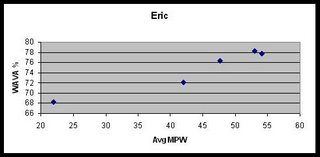One thing that stands out to me, you don't see any wava % of less than 60% for anyone running more than 50 mpw. For those of you that have no idea what a 60% wava means, here's an example: A 35 year old female with a wava of 60% would run a 3:51 marathon. A 40 year old man would run 3:35.

In any case, what's even more interesting is getting various points from 1 person and seeing them go from 58 wava on 45 mpw to 68 wava on 80 mpw. Some of this data is very linear. I need to dig out some old logs to see how this applies to my training/racing.





8 comments:
My bet on why your graph levels out after 70 mpw is two part. First, diminishing returns. Not disappearing returns but diminishing returns. I would actually expect this to be not a line but a curve that continues an upward trend but does so with less slope as mileage increases. Second, as mentioned, not enough data points. I happen to be the two highest (by training volume) data points on there. I can assure you that, if I had data points from 50-70 mpw, you'd see me right at the bottom of the spread within that range. I could actually offer some data points of people who train as I do and, without exception, they would all come out higher than me. Unfortunately, you just found an outlier for the high volume end of your data points.
I agree with Ryan on his first point (can't vouch for the second since I don't know people who train in excess of 70 mpw). But it is interesting that there's such a strong correlation between 70mpw and 80% wava.
Also, it'd be interesting to see how adding a "time since coach potato" variable would affect the data. That'd help tease out how much of this increase is due to increased miles and how much of it due to the fact that someone running 50-70 miles a week probably has several years of training behind them that someone doing 20 doesn't.
Are there plans for Survey II at some point in the future?
There are actually very few studies that attempt to measure the effect of mileage on performance, as "sports science" or "kinesiology" comes out of the laboratory rather than social scientific tradition.
One reputable study was this one.
One day i will write a post about this, it's been in the back of my mind for a while. The statistics of it are interesting--experiments are popular for a good reason--but the challenges of surveys have been overcome in other parts of science, so why not sports science???
Good stuff Zeke, you got me pouring through my logs too! The law of diminishing returns is also affected by my inceasing years.
Another reason your graph levels out after 70 mpw is that what most people are interested in is not how average mileage relates to average marathon times, but how does an increase in own mileage correspond to a decrease in marathon time.
This is both distinct from diminishing returns to mileage, and unrelated to the numbers of people who returned your survey. Ryan's comment addresses this, where he says "if I had data points from 50-70 mpw, you'd see me right at the bottom of the spread within that range."
That's why the individual graphs show a steeper and stronger relationship between mileage increases and time improvements. People respond differently to increased mileage, and there is an aspect of people who respond better to high mileage choosing to do so.
Jon's point has hit the nail on the head. You're never (normally) going to find someone who has 1 year TSCP (time since couch potato) running in excess of 70mpw - and you're never going to find someone in that category doing well in the WAVA scores either.
Most people who run high mileage have been at it for years and years. You can't seperate the variables.
Well...I suppose a truly scientific longitudinal study could do exactly that - seperate and identify the variables that are really making the difference.
I'm fascinated by the the 'flattening effect' you found though.
I still maintain that most people (myself included of course) focus on mileage while largely ignoring other, just as important ingredients to race success, such as the mental aspect. And this is exacerbated by a relative lack of discussion about it in our community...
Actually, I think the fact that you'll never find someone at 1 year TSCP (even if they could do 70 mpw without injury) knocking out 2:45 marathons is probably a different angle on the same argument that Zeke's making. Although undoubtedly weekly average is important, so is yearly rolling average. Training mileage may be adequate from one vantage point when it's woefully insufficient from another.
For example, the improvement from my first to second Half was nearly 20 minutes. For the first, in 2004, I'd been running an average of about 20 mpw for 6 months. If you take the 3 year rolling average, that comes up to about 3 mpw. For the second (same course, similar weather) in 2006, although I still only averaged about 20 mpw, my 3 year rolling average was now closer to 16 mpw. That's a huge increase. Although the mpw was the same, saying my overall training volume was the same would be an error akin to that made by the blind men trying to identify the elephant.
Although this comment may also be be making Evan's point about mileage increasers being self-selecting, my point is that training volume's not just a weekly thing. I'm learning that this is a sport that rewards the patient and that the body measures time not in weeks, but in seasons and years.
Some people say that a good marathon is largely about lifetime mileage, or "time since couch potato". It's not quite true, and I've experienced the caveats myself (lifetime mileage ain't worth anything when you're out for 3 months), but it has a large element of truth. The body remembers how to do things over a surprisingly long period of time.
Post a Comment